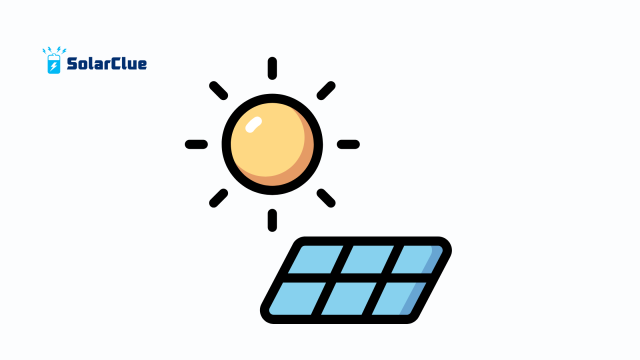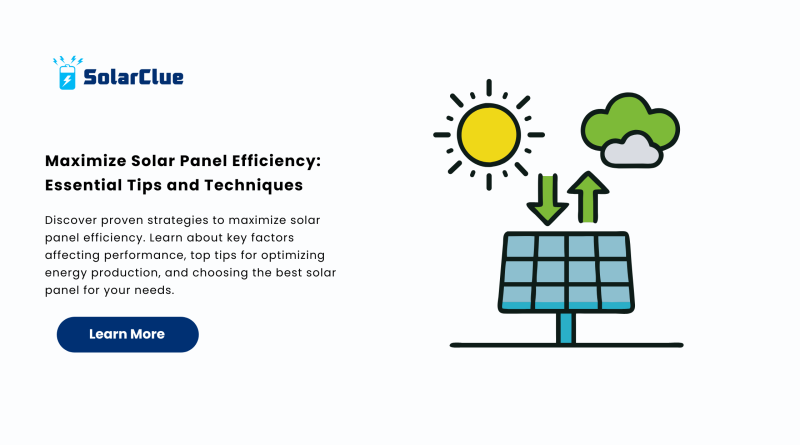Maximize Solar Panel Efficiency: Essential Tips and Techniques
As the world shifts towards renewable energy sources, solar power has emerged as a sustainable and cost-effective solution for powering homes and businesses. However, the true potential of solar energy lies in solar panel efficiency. Maximizing solar panel efficiency is crucial for optimizing your investment and ensuring that you get the most out of your solar power system.
In this blog, we’ll explore practical strategies to enhance the performance of your solar panels, helping you make informed decisions when it comes to solar power solutions. Whether you’re looking to improve your current system or considering a new installation, these tips will guide you toward a more efficient solar power system.
Table of Contents
What is Solar Panel Efficiency?
Solar panel efficiency refers to the amount of sunlight that a solar panel can convert into usable electricity. The higher the efficiency, the more electricity the panel can generate from a given amount of sunlight. Efficiency is influenced by factors such as the type of solar panel, its orientation, the angle of installation, and the overall condition of the system.
Why Solar Panel Efficiency Matters
-
Maximizing Energy Output: The more efficient your solar panels are, the more energy they produce. This means you’ll be able to power more of your home or business with solar energy, reducing your reliance on the grid and lowering your electricity bills.
-
Space Optimization: Higher-efficiency panels generate more electricity per square foot, which is especially important if you have limited roof space.
-
Cost-Effectiveness: Although high-efficiency panels may come with a higher upfront cost, they often provide a better return on investment in the long run by generating more power and reducing electricity bills.
Factors Affecting Solar Panel Efficiency
Several factors play a role in determining how efficiently a solar power system operates. Let’s take a closer look at the key elements that impact solar panel efficiency.
1. Panel Type
There are three main types of solar panels:
-
Monocrystalline Panels: These are made from a single crystal structure and are typically the most efficient, offering a high conversion rate of sunlight into electricity.
-
Polycrystalline Panels: These are made from silicon crystals and are slightly less efficient than monocrystalline panels but are more affordable.
-
Thin-Film Panels: These are less efficient but are flexible and can be used in a variety of applications.
When selecting the best solar panel, monocrystalline panels are often the top choice for efficiency.
2. Panel Orientation and Angle
To maximize solar panel efficiency, the solar panel must be installed at the correct angle and orientation. In general, solar panels should face true south in the Northern Hemisphere and true north in the Southern Hemisphere to receive optimal sunlight.
The tilt of your panels should be adjusted based on your location’s latitude. Panels should be positioned to capture sunlight during peak hours, typically between 9 AM and 3 PM.
3. Temperature
Although it’s a common misconception that solar panels work better in hotter climates, solar panel efficiency actually decreases as temperatures rise. High temperatures can cause the materials in solar panels to become less effective. It’s essential to install your solar power system in a location that allows for proper ventilation and cooling.
4. Shading
Shading from trees, buildings, or other structures can drastically reduce the energy output of your solar power system. Even partial shading can cause significant energy loss, as solar panels are often connected in series, and one shaded panel can drag down the entire system’s performance.
It’s important to keep your solar panels free from obstructions and to regularly trim any nearby trees or plants that might block sunlight.

How to Maximize Solar Panel Efficiency
Maximizing the performance of your solar panel system requires a combination of the right equipment, installation techniques, and maintenance practices. Here are some top tips to enhance solar panel efficiency:
1. Invest in High-Efficiency Panels
When looking for the best solar panel, focus on panels with a high efficiency rating. Monocrystalline panels generally offer the best performance, but newer technologies, like PERC (Passivated Emitter and Rear Cell) and Bifacial solar panels, can also enhance energy output by capturing more sunlight.
2. Optimize Panel Placement
Properly positioning your panels to ensure they face the correct direction and angle is essential for maximizing energy production. Work with a professional installer who can help calculate the ideal position for your solar panels based on your location.
3. Regular Maintenance and Cleaning
Solar panels require minimal maintenance, but regular cleaning is essential to keep them performing at their best. Dirt, dust, and debris can block sunlight and reduce the solar panel efficiency. Clean your panels every 6 to 12 months or more frequently if you live in a dusty area. Always ensure that cleaning is done with proper care to avoid damaging the panels.
4. Use a Solar Inverter with Maximum Power Point Tracking (MPPT)
The solar inverter plays a vital role in converting the energy collected by the panels into usable electricity. Choosing an inverter that uses Maximum Power Point Tracking (MPPT) technology can help your solar power system operate at its peak efficiency. MPPT ensures that the system constantly adjusts to the optimal operating point, maximizing energy production.
5. Monitor Your System’s Performance
Monitoring your solar power system will help you track performance and detect any issues early. Many solar power systems come with monitoring tools that allow you to check the energy production from your panels in real-time. This can help identify shading issues or malfunctions that need to be addressed.
Choosing the Best Solar Panel for Your Home
When selecting the best solar panel for your home or business, it’s important to consider factors like efficiency, cost, and the available space for installation. Monocrystalline panels are often the top choice for homeowners looking for the best balance of efficiency and price. However, depending on your specific needs, polycrystalline or thin-film panels might also be suitable.
Make sure to choose a solar power system that matches your energy requirements. A professional solar installer can assess your energy needs and recommend the right size system for optimal efficiency.
FAQs About Maximizing Solar Panel Efficiency
1. How can I increase the efficiency of my existing solar panels?
You can maximize the efficiency of your existing solar panels by keeping them clean, ensuring they are free from shading, and having them regularly checked for performance. If needed, you can also upgrade your inverter to one with MPPT technology.
2. Does the type of solar panel affect efficiency?
Yes, the type of solar panel significantly impacts efficiency. Monocrystalline panels tend to be the most efficient, followed by polycrystalline and thin-film panels.
3. Can I improve solar panel efficiency in a shaded area?
Shading can significantly reduce solar panel efficiency. To improve performance, consider removing any obstructions, trimming trees, or relocating the panels to a sunnier spot.
4. What temperature is ideal for solar panels?
While solar panels work best in moderate temperatures, high heat can decrease efficiency. It’s important to install your panels where they can stay cool and avoid excessive heat buildup.
Conclusion
Maximizing solar panel efficiency is crucial for getting the most out of your solar power system. By choosing the right solar panels, optimizing their placement, maintaining them regularly, and using advanced technology like MPPT, you can boost your system’s performance and reduce energy costs. Remember, solar panel efficiency isn’t just about the panels themselves—it’s about the entire solar power system working together to meet your energy needs.
To learn more about enhancing your solar power system, visit SolarClue or explore more insights at blog.solarclue.com


